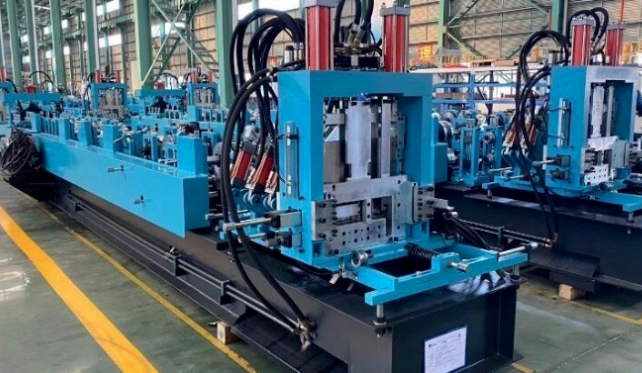A roll forming machine is a critical piece of equipment used in the metalworking industry to transform flat metal sheets or strips into precise, uniform shapes through a continuous bending process. Roll forming technology plays a pivotal role in various industries, including construction, automotive, aerospace, and more, where custom metal profiles are required for structural and aesthetic purposes. This blog explores the key aspects of roll forming machines, their components, advantages, and applications.
Key Components of a Roll Forming Machine
- Uncoiler/Decoiler
The process begins with an uncoiler or decoiler, which holds and feeds the metal coil into the machine. This component ensures a steady supply of raw material for the roll forming line, and it can be manual, motorized, or hydraulic, depending on the machine's automation level. - Roll Stands and Rollers
At the core of the machine are roll stands, each equipped with a pair of precisely aligned rollers. These rollers progressively bend the metal sheet as it passes through the machine, shaping it into the desired profile. The number of roll stands varies depending on the complexity of the design. - Cutoff Press
After the metal is shaped, a cutoff press ensures the profile is cut to the correct length. Depending on the machine, the cutoff can occur before or after forming. Some roll forming machines offer pre-punching or pre-notching options for additional customization. - Runout Table
The runout table supports the formed metal parts as they exit the machine, allowing for safe handling and stacking. It ensures that the completed product is transported without damage.
How Does a Roll Forming Machine Work?
Roll forming involves feeding a continuous strip of metal (usually from a coil) through a series of roll stands. As the metal moves through each station, the rollers gradually bend and shape the material into the desired profile. This process allows for precise control over dimensions and complex shapes, making roll forming machines ideal for high-volume production runs.
Advantages of Roll Forming Machines
- Precision and Consistency
One of the most significant advantages of roll forming machines is their ability to produce highly accurate and consistent metal profiles. The automated nature of the process ensures that each part is identical to the next, making roll forming ideal for mass production. - Customizable Profiles
Roll forming machines offer flexibility when it comes to creating custom shapes. Whether for roofing panels, gutters, door frames, or industrial components, manufacturers can tailor their machines to produce profiles specific to their project needs. - High Speed and Efficiency
Roll forming machines are designed for speed, making them highly efficient for large-scale production. They operate continuously, ensuring that large quantities of material can be processed with minimal downtime. - Cost-Effectiveness
The high output rate, combined with minimal material waste, makes roll forming a cost-effective manufacturing method. Additionally, the automation of the process reduces labor costs, offering further savings for manufacturers.
Applications of Roll Forming Machines
- Construction Industry
Roll forming machines are widely used to produce metal components such as roofing panels, purlins, steel decking, and drip edges, all critical for structural integrity and aesthetic appeal in both residential and commercial construction projects. - Automotive Industry
In the automotive industry, roll forming machines manufacture body panels, door frames, and structural reinforcements. The precision of roll forming is essential for maintaining vehicle safety standards. - Aerospace and Energy
The aerospace and renewable energy sectors utilize roll forming machines to create lightweight yet strong components for aircraft and solar panel installations. Roll forming technology is key to producing reliable parts that meet industry standards. - Guardrails and Barriers
Roll forming machines also play a crucial role in producing highway guardrails and safety barriers, ensuring durability and high performance in transportation infrastructure.
Types of Roll Forming Machines
- Standard Roll Forming Machines
These machines are designed to produce common profiles, such as roofing sheets or metal panels, typically used in construction projects. - Custom Roll Forming Machines
Custom roll formers allow manufacturers to create bespoke shapes for specific industries, whether producing complex profiles or unique materials such as aluminum or stainless steel. - Mobile Roll Forming Machines
For projects requiring on-site fabrication, mobile roll formers bring the flexibility of roll forming technology directly to the jobsite, saving transportation costs and time.
Conclusion
Roll forming machines are indispensable tools in the modern manufacturing landscape, offering a highly efficient, precise, and versatile method for producing metal profiles. Their ability to handle a wide range of materials, create customized designs, and operate with minimal waste makes them the go-to solution for industries that rely on high-quality, mass-produced metal components. Whether you're involved in construction, automotive, or energy projects, roll forming technology is key to ensuring that your products are durable, cost-effective, and made to exact specifications.




